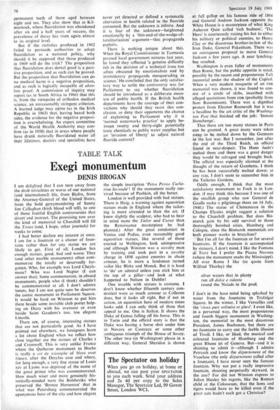CONSUMING INTEREST
Tooth truth
LESLIE ADRIAN
'Who ever knew Truth put to the worse, in a free and open encounter?' asked John Milton in the Areopagirica. '1, for one,' re- plied Richard Crossman, to all intents and purposes, in a letter sent last week to all lord mayors, mayors and chairmen of local councils. Truth, as defined by the department over which he presides, may be reduced in this context to four propositions. First, that dental decay is an extremely serious prob- lem. introducing millions to the tribulations of the flesh in early childhood. Second, that fluoride salts included in public water sup- plies will inhibit and diminish this disease if the water is drunk during the formative period of the teeth. Third, that a concen- tration of one part of fluoride to one million parts of water would be entirely without detrimental effect on consumers. And fourth, that no alternative means of taking fluoride can be, in the age of the permissive parent, so universally applicable.
These propositions, notes the minister, are not in issue between the political parties. Right. Their first official endorsement came from Enoch Powell. That was in December 1962, when five-year studies of water fluoridation in Watford, in the Gwalchmai zone of Anglesey and in Kilmarnock had shown the percentage of children with ten or more decayed teeth at the age of five to have been reduced from 14.6 to 1.6. Dental decay among young children had been cut by half, and twice as many as normal had completely sound teeth. We seemed to be on the threshold of an era in which a proven public health measure would bring caries under control. Yet over six years later scarcely more than two million people in the ux are receiving fluoridated drinking water—a minute pro- portion of the population compared with the six million in Canada and the seventy-two million in the us.
The situation is blamed neither on apathy nor on parsimony but, by implication, on fear. It is attributed by the Minister to 'the vigorous campaign against fluoridation which has been mounted all over the coun- try by a number of pressure groups. As a result of the activity of these groups, coun- cils in many parts of the country are being persuaded to reject this measure and in some cases these are in effect vetoing what already has the approval of a number of neighbouring councils served by the same water supply.' In an attempt to counter such pressures. the 1962 reports has been up-dated and the results achieved after eleven years of fluoridation in the study areas are being given wide circulation. These demonstrate the very considerable benefits it confers, not only on the tempor- ary teeth of younger children but on the permanent teeth of those aged between eight and ten. They also show that in Kil- marnock, where fluoridation was abandoned after six and a half years of success, the prevalence of decay has risen again almost to its original level.
But if the statistics produced in 1962 failed to persuade authorities to adopt fluoridation as a national policy, why should it be supposed that those produced in 1969 will do the trick? The proposition that fluoridation does dental good is a posi- tive proposition, and as such can be proved. But the proposition that fluoridation can do no medical harm is a negative proposition, and as such is logically incapable of abso- lute proof. A commission of inquiry may report (as in South Africa in 1966) that this is, from the viewpoint of orthodox medical science, an unreasonably stringent criterion. A learned judge may opine (as in the Irish Republic in 1963) that, having heard both sides, the evidence for the negative proposi- tion is overwhelming. An expert committee of the World Health Authority may con- firm (as in 1958) that in areas where people have drunk naturally fluoridated water all their lifetimes, doctors and specialists have
never yet detected or defined a systematic aberration in health related to the fluoride consumed. But the unknown is infinite. And it is fear of the unknown—heightened emotionally by a 'thin-end-of-the-wedge-of- totalitarianism' argument—that propaganda exploits.
There is nothing unique about this. When the Royal Commissioner in Tasmania perused local government minutes last year, he found they reflected 'a genuine difficulty felt in the decision of a technical issue too 'often obscured by emotionalism and by intimidatory propaganda masquerading as science.' He concluded that the only satisfac- tory way to settle the controversy was for Parliament to say whether fluoridation should be introduced as a deliberate meas- ure of public health. If the British health departments have the courage of their con- victions why should they resist this con- clusion, or deny their opponents the chance of explaining to Parliament why it is `normal waterworks practice' to apply be- tween twenty and thirty-eight potentially toxic chemicals to public water supplies but an 'invasion of liberty' to adjust natural fluoride content?



































 Previous page
Previous page